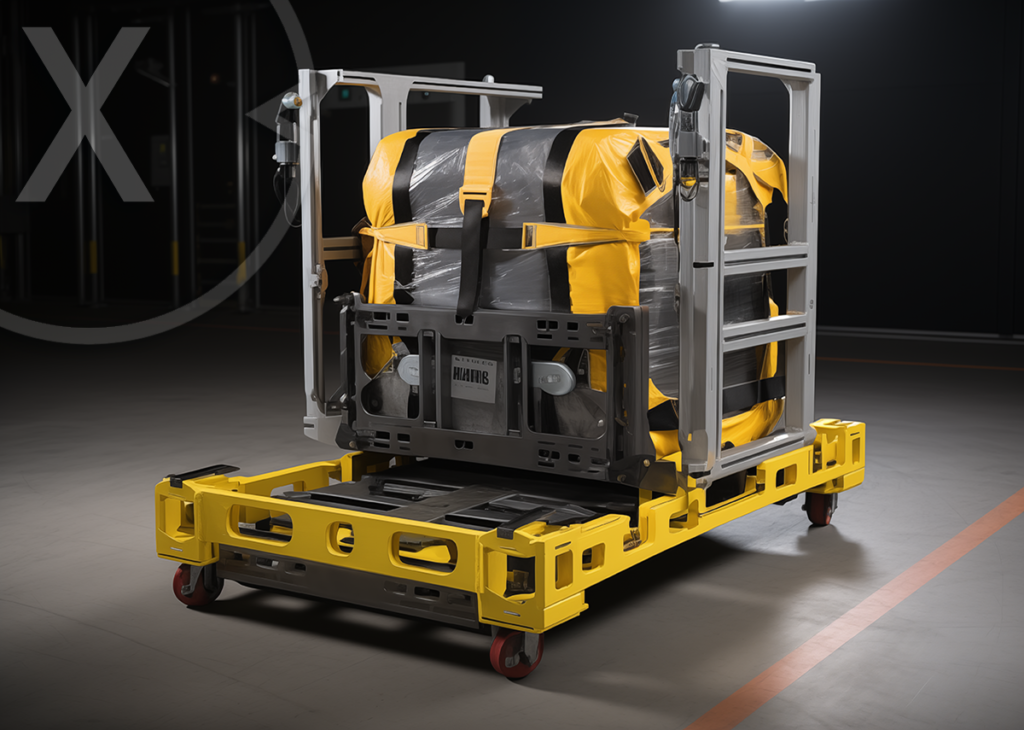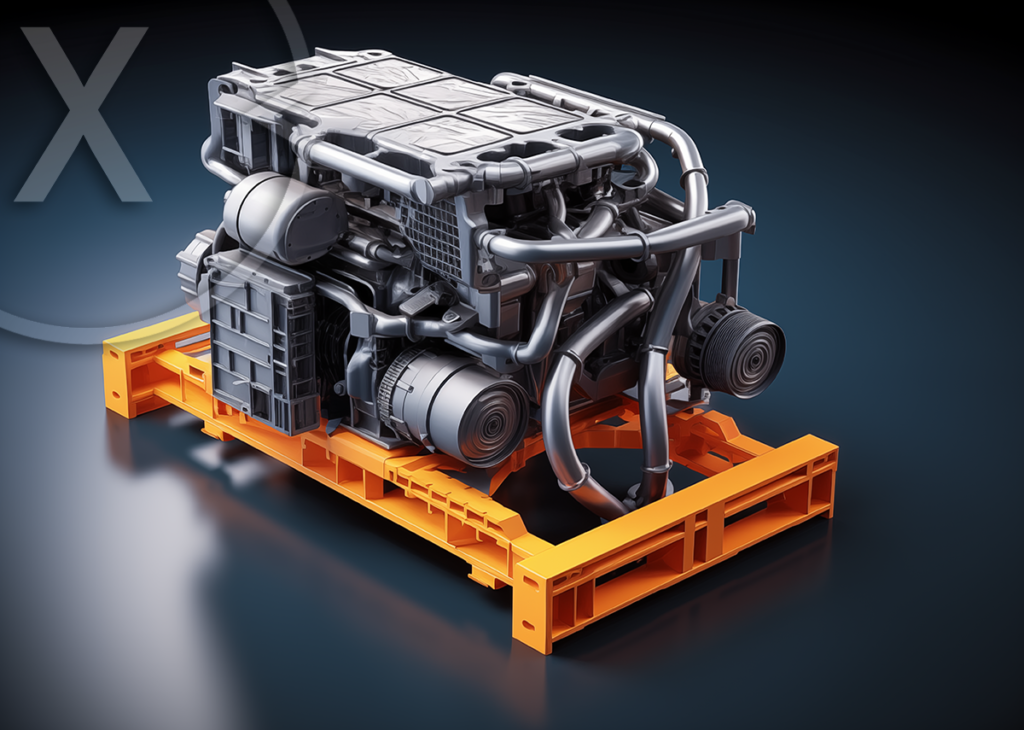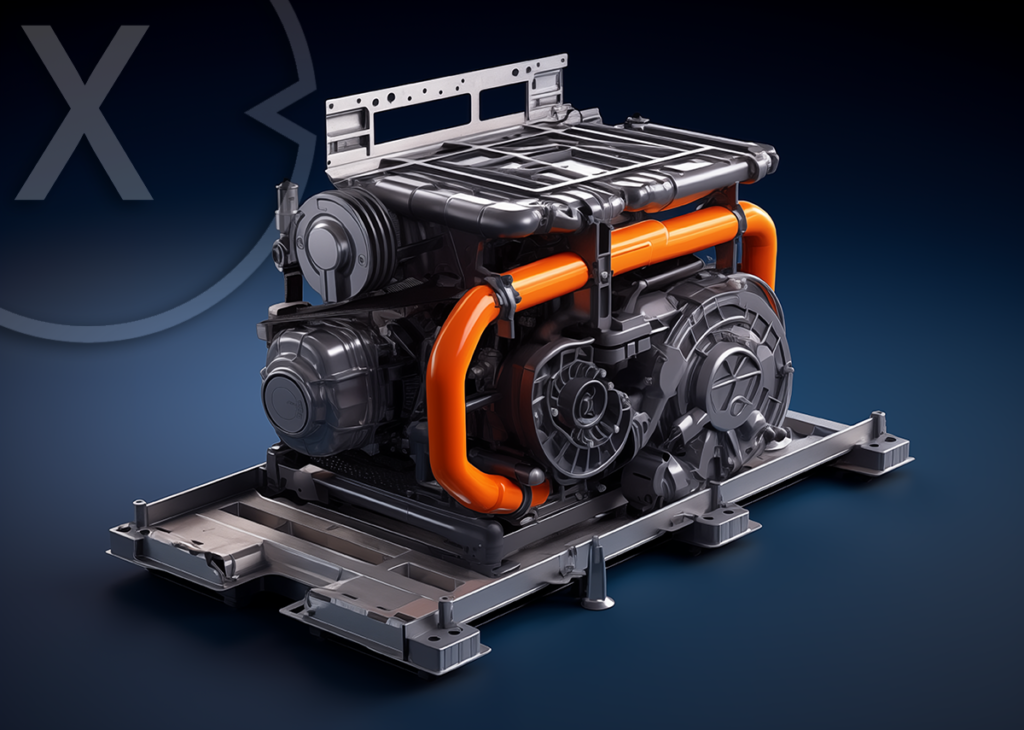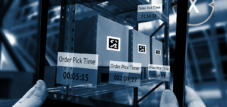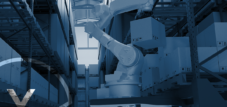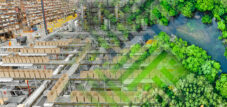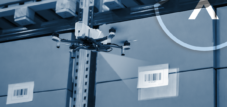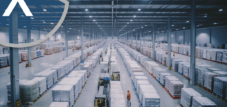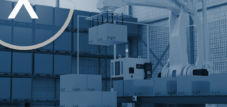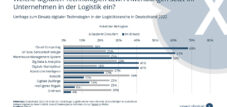Logistics & Intralogistics: Load carriers in electromobility – key components for the transport and packaging of components
Language selection 📢
Published on: October 25, 2023 / update from: November 7, 2023 - Author: Konrad Wolfenstein
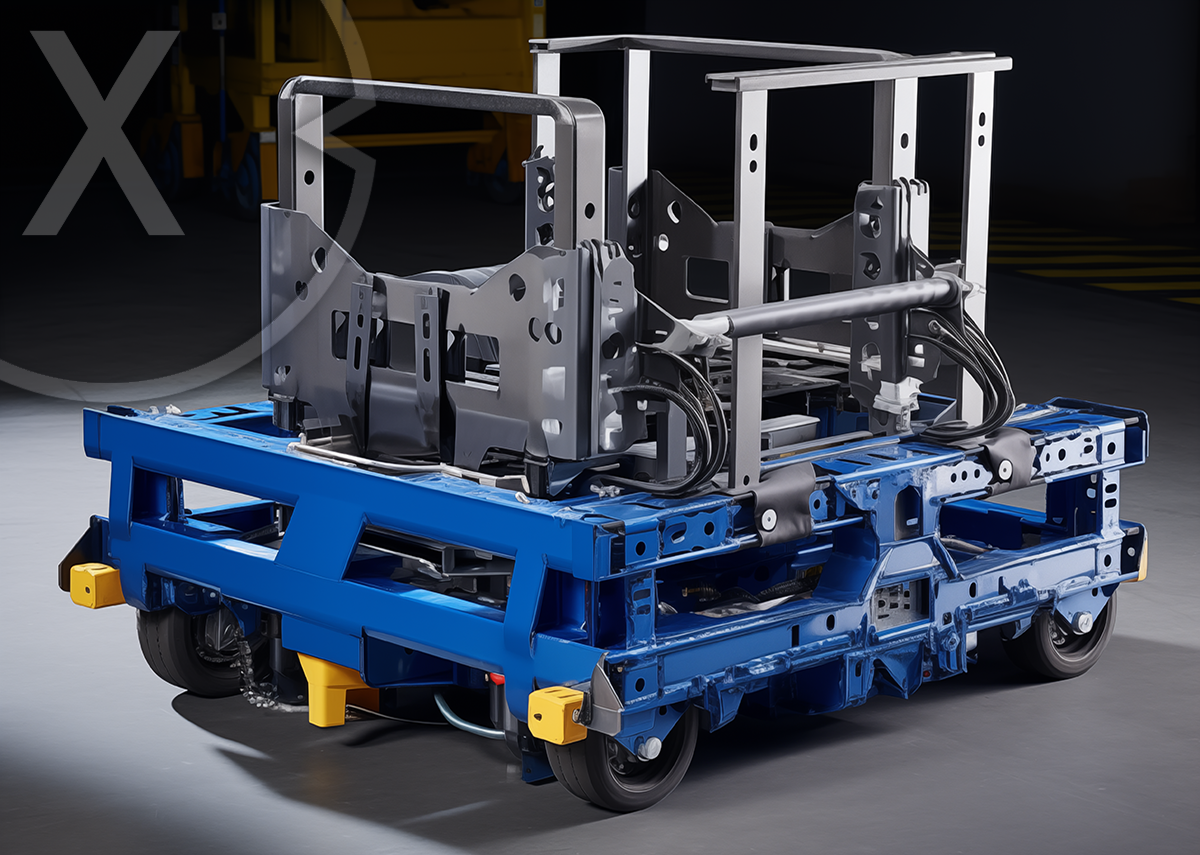
Logistics & Intralogistics: Sample of a special production for individual transport load carriers in electromobility - Image: Xpert.Digital
🔌 Electromobility and its importance
Electromobility has experienced rapid development in recent years and has become a central topic in the automotive industry. With the rise of electric and hybrid vehicles, the requirements for transport and packaging solutions have also fundamentally changed. In this article we will take a closer look at charge carriers and discuss their importance for electromobility.
🔍 What are load carriers?
Load carriers are special transport and packaging solutions that are used to transport and store components and products safely and efficiently. These load carriers can be made from various materials such as plastic, metal or wood and are often designed to meet the specific requirements of a particular product or product group. They are used in various industries, from the food industry to automobile production.
⚡ The importance of charge carriers in electromobility
Electromobility has developed into a driving force in the automotive industry in recent years. Electric and hybrid vehicles are becoming increasingly important as they represent an environmentally friendly alternative to conventionally powered cars. However, with this development, new requirements have arisen for logistics and transport.
🚗 Specially developed load carriers for electric and hybrid vehicles
Charge carriers for electromobility are developed specifically for the requirements of hybrid and electric vehicles. These vehicles contain a variety of sensitive components, including batteries, electric motors and power electronics. The load carriers must be designed in such a way that they transport these components safely and protect them from damage. This often requires tailor-made solutions that are precisely tailored to the geometry and sensitivity of the components.
📦 Protection of goods during transport
Another crucial aspect is the protection of the goods during transport. Electromobility often requires the transport of expensive and sensitive components that must be handled carefully to avoid damage. Load carriers play a crucial role in protecting these components from shock, vibration and other stresses during transport. This not only helps maintain the quality of the products, but also prevents expensive breakdowns and repairs.
🚚 Integration into logistics processes
Load carriers must be able to be seamlessly integrated into existing logistics processes. This means that they not only have to ensure the protection of the goods, but also fit efficiently into the storage and transport process. This is where the adaptability of load carriers comes into play. They must be designed in such a way that they can be easily integrated into the existing processes of manufacturers and suppliers. This increases efficiency and reduces costs throughout the supply chain.
🤖 Automation and robotics
Automation is playing an increasingly important role in modern manufacturing and logistics. Load carriers must therefore be able to be used not only manually, but also automatically. This enables efficient and cost-effective transport and storage of the components. The ability to automate load carriers is particularly important when used in conjunction with robotics to optimize production and logistics processes.
🌟 Latest developments in electromobility and load carriers
Electromobility is continually developing, and the load carrier industry is also adapting to these changes. Here are some of the latest developments and trends:
1. Lightweight construction and sustainability
In electromobility, the focus is on lightweight construction in order to maximize the range of the vehicles. Load carriers are increasingly being made from lighter yet robust materials to save weight and reduce environmental impact.
2. Intelligent load carriers
As technology advances, charge carriers are becoming increasingly intelligent. They can be equipped with sensors and IoT devices to monitor the status of transported goods in real time and make the supply chain more efficient.
3. Reusability and recycling
Sustainability also plays an important role when it comes to load carriers. More and more companies are turning to reusable and recyclable load carriers to reduce waste and conserve resources.
4. Adaptability
Load carriers must be able to quickly adapt to changing requirements. This is particularly important in a rapidly developing industry such as electromobility, where product geometries and requirements change frequently.
🚛 Transporting electromobility components with safe load carriers
Charge carriers are inconspicuous but crucial components in electromobility. They not only ensure the safe transport of components, but also contribute to efficiency and sustainability in the supply chain. As electromobility and the cargo carrier industry continue to develop, we will certainly see many more exciting innovations and improvements that will help drive this transformative industry forward.
📣 Similar topics
- Electromobility and the role of charge carriers 🚗⚡
- Innovative transport solutions for electromobility 🌐📦
- Load carriers in the automotive industry: A look into the future 🔮🚘
- Sustainability in electromobility: charge carriers as the key 🌱🔑
- Efficient transport for electric vehicles: The importance of load carriers 📈🔋
- Intelligent charge carriers for modern electromobility 🧠💼
- Load carriers and the challenges of electromobility 🛡️🚚
- Lightweight construction and load carriers: innovations for electromobility 🌟🏗️
- Logistics 4.0: The integration of load carriers into automated processes 🤖📊
- Charge carriers through the ages: trends in electromobility 🔄📰
#️⃣ Hashtags: #Electromobility #Load carriers #Transportation solutions #Sustainability #Innovations
📦 Various patterns of specially made transport load carriers
- Logistics & Intralogistics: Sample of a special production for machines – Image: Xpert.Digital
- Logistics & Intralogistics: Sample of a special product for engines – Image: Xpert.Digital
- Logistics & Intralogistics: Sample of a special product for engines – Image: Xpert.Digital
📦 Logistics 4.0: The integration of intelligent load carriers into automated processes
In the era of Logistics 4.0, a fundamental change is taking place in the way load carriers are integrated into automated processes. This change brings with it a wealth of innovations and challenges that are fundamentally changing the logistics industry. In this article we will look at Logistics 4.0 in detail and in particular look at the integration of load carriers in these state-of-the-art processes.
📋 1. The basics of Logistics 4.0
Logistics 4.0 is a term that is closely linked to Industry 4.0. It is an approach that includes the progressive digitalization and networking of logistical processes both inside and outside of companies. The most modern technologies such as the Internet of Things (IoT), artificial intelligence (AI) and big data analytics are used to increase efficiency and flexibility in logistics.
📦 2. The role of load carriers in logistics
Load carriers play a crucial role in logistics as they are used to transport and store goods safely and efficiently. Traditionally, load carriers were simple pallets, containers and containers. However, in the era of Logistics 4.0, these load carriers are becoming intelligent, networked units.
🔍 3. Smart load carriers
Smart load carriers are equipped with sensors that can capture information in real time. For example, they can track temperature, humidity, location and movement. This data is then transmitted to a central control platform via the IoT. This enables complete transparency about the status of the load carriers and the goods on them.
🚀 4. Advantages of integrating load carriers into automated processes
The integration of intelligent load carriers into automated processes offers a variety of advantages:
Real-time tracking
Companies have access to the location and condition of their load carriers at any time and can thus minimize losses and increase safety.
Increased efficiency
The automated control of load carriers enables optimal use of storage and transport capacities.
Cost savings
Significant cost savings can be achieved by reducing theft, damage and loss of load carriers.
sustainability
Precise control of load carriers helps reduce resource consumption and minimize waste.
🤔 5. Challenges of integrating load carriers in Logistics 4.0
Although the integration of intelligent load carriers offers many advantages, there are also some challenges to be overcome:
Cost
The purchase and implementation of intelligent load carriers can initially be expensive. Companies must weigh the long-term benefits against the initial costs.
Data security
The transmission of sensitive data from load carriers over the Internet requires strict security precautions to prevent data leaks and hacker attacks.
Training and Acceptance
Employees need to be trained to use the new technologies and there may be resistance to change.
🏭 6. Examples from practice
A notable example of the integration of load carriers into automated processes is the use of automated guided vehicles (AGVs) in warehouses. These AGVs are capable of moving intelligent pallets and containers autonomously, using sensor data to detect obstacles and choose the optimal path.
Another example is the use of smart bins in waste logistics. These smart dumpsters are equipped with sensors that measure the level. When a container is full, a notification is automatically sent to garbage collection to schedule collection. This reduces empty runs and significantly reduces operating costs.
🔮 7. Future prospects
The integration of load carriers into automated processes is an exciting and constantly evolving field. In the future, we could see even more advanced charge carriers capable of autonomously making decisions and communicating with other intelligent systems. This would further increase the efficiency of the entire supply chain.
🔚 8. Logistics 4.0: Smart load carriers
Logistics 4.0 and the integration of intelligent load carriers into automated processes are closely linked and have the potential to fundamentally change the way companies carry out their logistics processes. Using state-of-the-art technologies and converting simple load carriers into intelligent, networked units opens up a variety of opportunities to increase efficiency, reduce costs and promote sustainability.
When it comes to future prospects, the possibilities are almost limitless. Advanced load carriers that can make decisions autonomously and communicate seamlessly with other intelligent systems could further increase the efficiency of the entire supply chain and drive the logistics industry even further towards digitalization and connectivity.
The integration of load carriers into automated processes in the era of Logistics 4.0 shows how the logistics industry is continuously developing and finding new ways to optimize transport, storage and use of resources. Companies that invest in these technologies could benefit from improved efficiency and competitiveness in the long term.
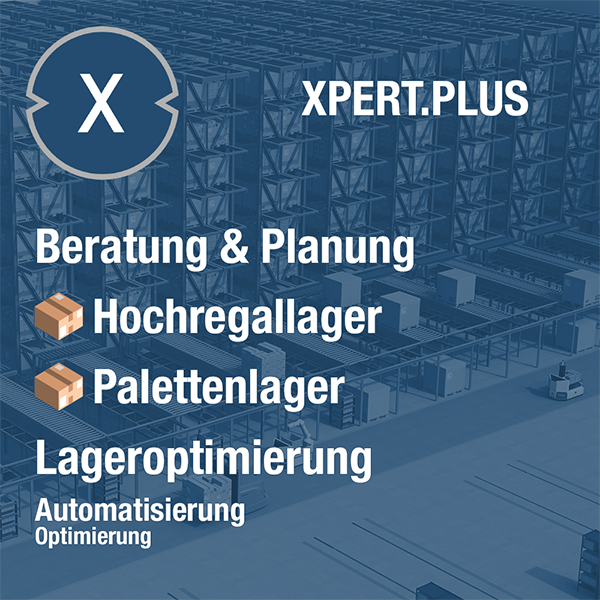
Xpert.Plus warehouse optimization - high-bay warehouses such as pallet warehouses consulting and planning
Plan your solar system for the most common applications conveniently online with our solar system planner!
With our user-friendly solar system planner you can plan your individual solar system online. Whether you need a solar system for your home, your business or for agricultural purposes, our planner offers you the opportunity to take your specific requirements into account and develop a tailor-made solution.
The planning process is simple and intuitive. You simply enter relevant information. Our planner takes this information into account and creates a tailor-made solar system that meets your needs. You can try out different options and configurations to find the optimal solar system for your application.
Additionally, you can save your plan to review later or share with others. Our customer service team is also available to answer your questions and provide support to ensure your solar system is optimally planned.
Use our solar system planner to plan your individual solar system for the most common applications and advance the transition to clean energy. Start now and take an important step towards sustainability and energy independence!
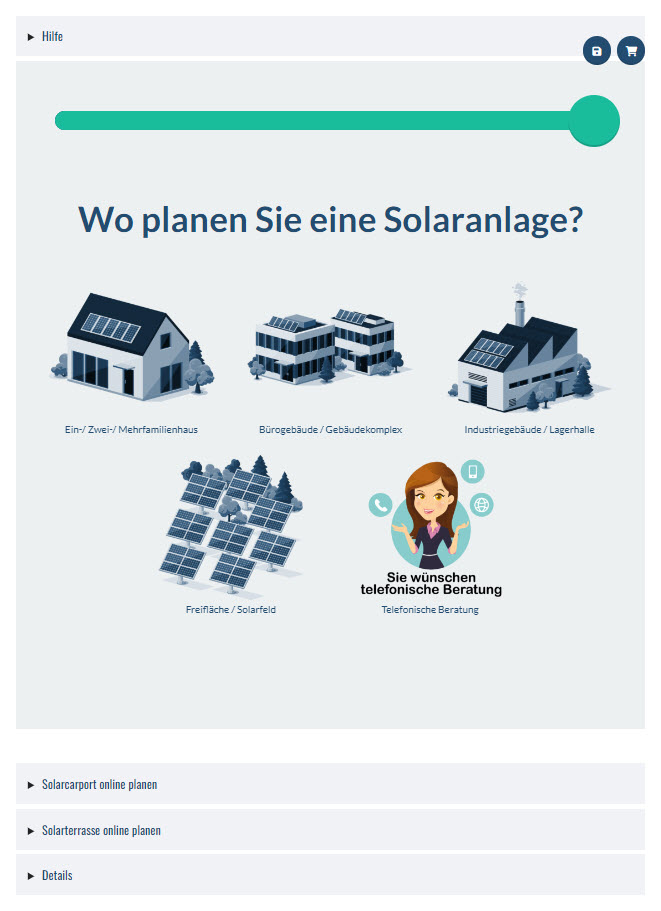
The solar system planner for the most common applications: Plan the solar system online here - Image: Xpert.Digital
More about it here:
We are there for you - advice - planning - implementation - project management
☑️ Smart City & Factory: Industry expert for energetic 5G buildings and halls as well as advice and installation of solar systems
☑️ Xpert.Plus - logistics consulting and logistics optimization
☑️ Industry expert, here with his own Xpert.Digital Industry Hub with over 2,500 specialist articles
I would be happy to serve as your personal advisor.
You can contact me by filling out the contact form below or simply call me on +49 89 89 674 804 (Munich) .
I'm looking forward to our joint project.
Xpert.Digital - Konrad Wolfenstein
Xpert.Digital is a hub for industry with a focus on digitalization, mechanical engineering, logistics/intralogistics and photovoltaics.
With our 360° business development solution, we support well-known companies from new business to after sales.
Market intelligence, smarketing, marketing automation, content development, PR, mail campaigns, personalized social media and lead nurturing are part of our digital tools.
You can find out more at: www.xpert.digital - www.xpert.solar - www.xpert.plus



